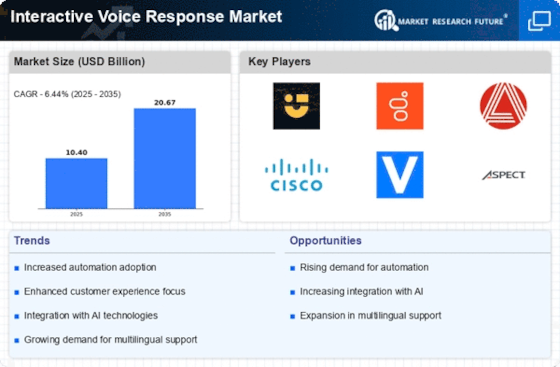Market Analysis
In-depth Analysis of Interactive Voice Response Market Industry Landscape
The Interactive Voice Response (IVR) market is experiencing dynamic shifts driven by technological advancements and evolving consumer expectations. IVR, a technology that enables automated communication between computers and humans through voice or DTMF tones, plays a pivotal role in customer service and business operations. One key factor influencing the market dynamics is the rapid adoption of artificial intelligence (AI) and natural language processing (NLP) within IVR systems. These technologies enhance the capabilities of IVR by enabling more sophisticated and context-aware interactions, thereby improving the overall customer experience.
Customer demand for seamless and personalized interactions is another driving force shaping the IVR market. Businesses are increasingly recognizing the importance of delivering a frictionless experience, and IVR systems are evolving to meet these expectations. Personalization features, such as recognizing and addressing customers by name, understanding their preferences, and anticipating their needs, are becoming standard offerings in modern IVR solutions.
The rise of cloud-based IVR solutions is also a notable trend influencing market dynamics. Cloud-based IVR systems offer greater flexibility, scalability, and cost-effectiveness compared to traditional on-premise solutions. This shift to the cloud enables businesses to easily adapt to changing requirements, scale their operations, and integrate IVR with other cloud-based services seamlessly. The accessibility and ease of deployment associated with cloud solutions contribute significantly to the growth of the IVR market.
Furthermore, the integration of IVR with omnichannel communication strategies is playing a crucial role in shaping market dynamics. Businesses are recognizing the importance of providing a consistent and integrated experience across various communication channels, including voice, text, chat, and social media. IVR systems are evolving to seamlessly integrate with these channels, ensuring a unified and cohesive customer experience. This integration not only enhances customer satisfaction but also enables businesses to gather valuable insights into customer preferences and behaviors.
On the regulatory front, compliance requirements are influencing the development and deployment of IVR systems. Stringent data protection regulations and privacy concerns are prompting businesses to implement secure and compliant IVR solutions. Ensuring that IVR systems adhere to industry standards and regulations is becoming a key consideration for businesses, impacting the choices they make in selecting and implementing IVR technology.
Competitive dynamics within the IVR market are characterized by a growing number of vendors offering specialized solutions to cater to diverse industry needs. As the market matures, vendors are differentiating their offerings by focusing on specific verticals, customization capabilities, and integration options. This trend is contributing to a more competitive landscape, prompting vendors to continually innovate and enhance their offerings to stay ahead in the market.


















Leave a Comment